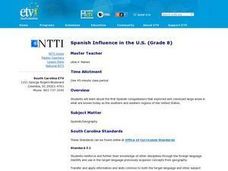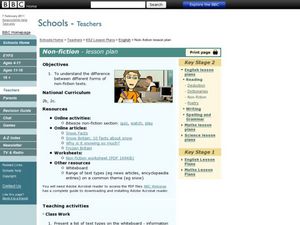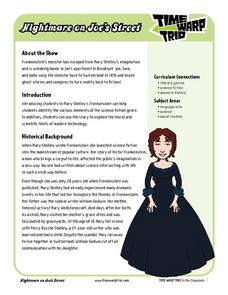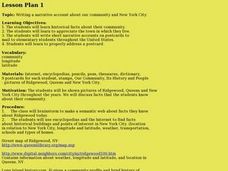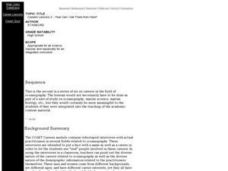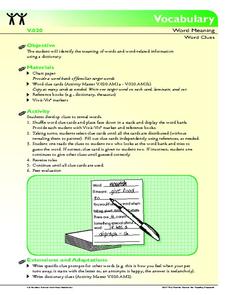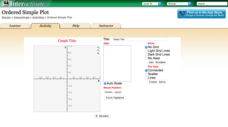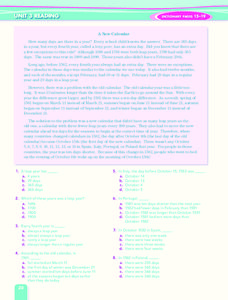Curated OER
Revolutionary War Spy Methods
Students research how coded messages were used during the Revolutionary War. In this Revolutionary War lesson, students view primary documents about the Revolutionary War spies and the methods used for sending messages. Students write a...
Curated OER
Christmas Tree Shaped Poems
Students think about ways in which they can spread joy during the holiday season. They create poems in the shape of a Christmas tree. Pupils use formatting tools in Microsoft Word to format the text of the poem. Students discuss ways...
Curated OER
Spanish Influence in the U.S.
Eighth graders research the role of the first Spanish conquistadors who explored the now United States. Using the internet, they gather information on different explorers and write a paper about why he is important in American history. ...
Curated OER
Identifying Mammals
Students investigate mammals. In this biology lesson, students use various websites to investigate mammals and their body parts. Students take notes the websites.
Curated OER
Map Your State: Regions of Arizona
Fourth graders define vocabulary and locate physical features on maps. In this mapping lesson, 4th graders explore regions of Arizona through landforms found on topographic maps. Students research the history and culture of...
Curated OER
Non-Fiction Texts
Third graders examine different types of non-fiction texts. In this non fiction lesson, 3rd graders use different types of texts to gather information. Students work in groups to analyze the texts for author's purpose, common...
Curated OER
Nightmare on Joe's Street
Students conduct research and create an eponym dictionary. They use their imaginations to create their own monster. They have a Monster Mash day to show off their creations.
Curated OER
Computers: Caught in the Web
Young scholars conduct Internet research about various websites noting the design and appearance of them. Working in small groups, they compare and contrast the sites and share their opinions of them with classmates. They also examine...
Curated OER
Comparing Utah's Past and Present Government
Fourth graders research the past and present forms of government in Utah. In this government studies lesson students analyzes different forms of government and work with a group to gather information about how Utah was/is run and then...
Curated OER
Our community and New York City
Fourth graders research websites to gather information about New York City and the Ridgewood community. In this New York City and Community lesson, 4th graders make a semantic map. Students write short postcards to send to students...
Curated OER
Careers Lessons 2 - How Can I Get There from Here?
Students identify differences between jobs and careers, and identify career areas within the broad field of oceanography. They research, compare and contrast requirements needed to become a practitioner of various oceanographic career...
Curated OER
Human Rights Violations
Students define human rights and discuss examples of various human rights. They conduct Internet research, develop a list of human rights, and in small groups create a poster illustrating the class definition of human rights.
Curated OER
Fruit or Vegetable?
Watermelon is a vegetable? A tomato is a fruit? Believe it or not, this debate is decades old. Groups examine rulings by the US Supreme Court, the USDA, and state statutes before developing their own criteria to use when labeling...
Curated OER
Dalai Lama Peace and Conflict Resolution
Learners explore philosophy by researching the Dalai Lama. In this peaceful living lesson, students discuss the Dalai Lama and his unique views of the world before reading the story Can You Say Peace? Learners answer study questions...
Florida Center for Reading Research
Advanced Phonics: Morpheme Structures, Compound Construction
A phonics lesson focuses on morpheme structures—compound words. Pairs choose letter cards, identify a compound word that starts with that letter and write it on a whiteboard. Extension opportunities include additional practice pages.
Florida Center for Reading Research
Vocabulary: Word Meaning, Word Clues
Young learners develop a deeper understanding of target vocabulary. In pairs, pupils independently complete a series of word clue cards, asking them to find information about key terms, including their definitions, synonyms, antonyms,...
abcteach
Flowers for Algernon, by Daniel Keyes
Looking for materials to accompany your study of Flowers for Algernon, by Daniel Keyes? Look no further! Included here is everything you need to go alongside your unit: worksheets, graphic organizers, writing assignments, an assessment,...
National Endowment for the Humanities
Kate Chopin's "The Awakening": No Choice But Under?
The first in a series of three resources designed to accompany a reading of Kate Chopin's The Awakening provides readers with background information about Chopin, Creole culture, literary realism, and women's suffrage.
Civil War Trust
Transcribing Civil War History
Primary sources are valuable for understanding the context of historical events, but the diction and dialect in these documents can be difficult to understand. Middle and high schoolers participation in a transcription process in which...
Shodor Education Foundation
Caesar Cipher
Caesar ciphers hide secret missives. A simple interactive lets users encode and decode hidden messages. The cipher method here is the Caesar shift.
Shodor Education Foundation
Simple Maze Game
Avoid the mines and win the game! Young scholars direct a robot through a minefield by plotting points. Their goal is to reach the target in as few moves as possible.
Shodor Education Foundation
Ordered Simple Plot
Open your imagination to make algebra-inspired creations. An interactive lesson has scholars graph images from a set of parameters. Users can practice minimum values, maximum values, and scale as well as key features.
Curated OER
Hoot: Vocabulary Squares
Study the vocabulary from Carl Hiaasen's Hoot with an activity featuring synonyms and antonyms. Kids fill in a graphic organizer for each word, prompting critical thinking as they find additional ways to put the word into context.
Pearson Longman
A New Calendar
The year 1582 was a very strange year. That year there was no October 5, 6, 7, 8, 9, 10, 11, 12, 13, or 14. Kids find out why when they read this short comprehension worksheet with a passage about the new calendar instituted in 1582.




